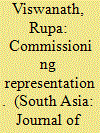|
|
|
Sort Order |
|
|
|
Items / Page
|
|
|
|
|
|
|
| Srl | Item |
| 1 |
ID:
140463


|
|
|
|
|
| Summary/Abstract |
Commissions of inquiry are unique tools of modern governance that represent ‘the people’, but in a manner quite unlike parliaments and other forms of elected political representation. Using as its example the 2007 Misra Report, this paper reveals how, in the production of a commission report, scores of non-state actors—‘stakeholders’ from a wide range of social strata—are enlisted to produce the policies that will then redound upon those very stakeholders. In thus consulting the people and eliciting their speech, commissions serve to publicly enact, in a controlled setting, the deliberative ideal of democracy that is otherwise absent in India. In this particular instance, the problematic status of Dalits is subsumed under the normative religious identity of the post-colonial Indian nation, a conclusion whose emergence through reasoned debate is publicly enacted in the form of the commission.
|
|
|
|
|
|
|
|
|
|
|
|
|
|
|
|
| 2 |
ID:
181832


|
|
|
|
|
| Summary/Abstract |
For decades, Plateau State in Nigeria's Middle Belt has witnessed repeated ethnoreligious violence. Over this period, both state and federal governments have established formal Commissions of Inquiry (COIs) in response to unrest, tasked with investigating violence, identifying perpetrators, and – ultimately – strengthening accountability. While commissions’ mandates and specific outcomes varied, there is general consensus that inquiries have been largely ineffective at securing justice or establishing accountability for violence. This study seeks to understand the expectations placed on, and role of, COIs in Plateau State as pathways to formal accountability in a context of recurring violence. We argue that COIs are embedded in the complex, multilevel networks and politics of state and non-state institutions. Civil society, in turn, has diverse expectations and demands, and articulates these in fragmented ways. As a result, COIs served primarily as another avenue for interest-based negotiations.
|
|
|
|
|
|
|
|
|
|
|
|
|
|
|
|
|
|
|
|
|